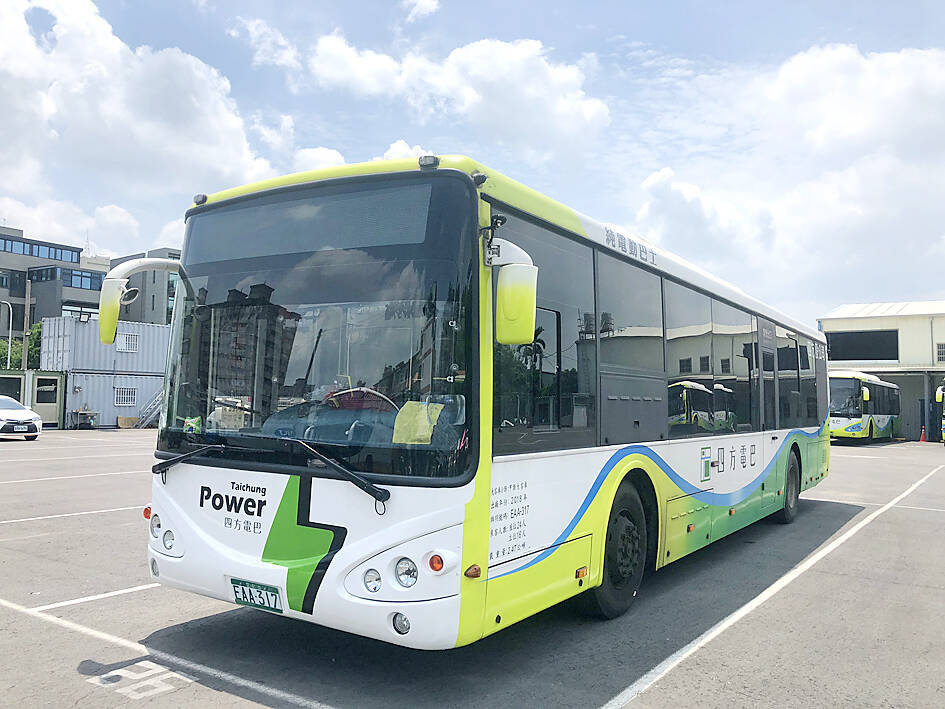About 50 drivers from Taichung-based SF E-bus (四方電巴) yesterday went on strike after the company failed to pay their salaries as scheduled for a third time, halting 470 services on 13 routes, the Taichung Transportation Bureau said.
The city government mobilized drivers from four other bus companies to fill the gap in labor, Taichung Transportation Bureau Director-General Yeh Chao-fu (葉昭甫) said, adding that it also fined the bus operator NT$2.35 million (US$72,767) and NT$90,000 for breaching its operating contract with the city government and the Highway Act (公路法).
Meanwhile, the drivers went to the city government yesterday to apply for labor dispute mediation, complaining that the latest incident is the third time this year the company had failed to pay their salaries on time.

Photo: Su Chin-feng, Taipei Times
SF E-bus first started reporting pay delays last month, a representative of the bus drivers told the Central News Agency, adding that the company failed to pay them again on Friday last week and did not provide an explanation.
While SF E-bus later guaranteed that salary payments would be made no later than Sunday after it receives a subsidy from the government, the representative said the vast majority of drivers refused to “cooperate again,” demanding that their salaries be paid immediately and the termination of their contracts with the company.
In response, the Taichung Labor Affairs Bureau said that it fined SF E-bus NT$40,000 on Wednesday last week after its employees filed complaints about the pay delay last month, adding that it plans to hold a dispute settlement meeting between the management and the drivers.
Yeh also called for the intervention of SF E-bus’ parent company, Tang Eng Iron Works Corp (唐榮), which is 11 percent owned by the central government.

Micron Memory Taiwan Co (台灣美光), a subsidiary of US memorychip maker Micron Technology Inc, has been granted a NT$4.7 billion (US$149.5 million) subsidy under the Ministry of Economic Affairs A+ Corporate Innovation and R&D Enhancement program, the ministry said yesterday. The US memorychip maker’s program aims to back the development of high-performance and high-bandwidth memory chips with a total budget of NT$11.75 billion, the ministry said. Aside from the government funding, Micron is to inject the remaining investment of NT$7.06 billion as the company applied to participate the government’s Global Innovation Partnership Program to deepen technology cooperation, a ministry official told the

Taiwan Semiconductor Manufacturing Co (TSMC, 台積電), the world’s leading advanced chipmaker, officially began volume production of its 2-nanometer chips in the fourth quarter of this year, according to a recent update on the company’s Web site. The low-key announcement confirms that TSMC, the go-to chipmaker for artificial intelligence (AI) hardware providers Nvidia Corp and iPhone maker Apple Inc, met its original roadmap for the next-generation technology. Production is currently centered at Fab 22 in Kaohsiung, utilizing the company’s first-generation nanosheet transistor technology. The new architecture achieves “full-node strides in performance and power consumption,” TSMC said. The company described the 2nm process as

Shares in Taiwan closed at a new high yesterday, the first trading day of the new year, as contract chipmaker Taiwan Semiconductor Manufacturing Co (TSMC, 台積電) continued to break records amid an artificial intelligence (AI) boom, dealers said. The TAIEX closed up 386.21 points, or 1.33 percent, at 29,349.81, with turnover totaling NT$648.844 billion (US$20.65 billion). “Judging from a stronger Taiwan dollar against the US dollar, I think foreign institutional investors returned from the holidays and brought funds into the local market,” Concord Securities Co (康和證券) analyst Kerry Huang (黃志祺) said. “Foreign investors just rebuilt their positions with TSMC as their top target,

POTENTIAL demand: Tesla’s chance of reclaiming its leadership in EVs seems uncertain, but breakthrough in full self-driving could help boost sales, an analyst said Chinese auto giant BYD Co (比亞迪) is poised to surpass Tesla Inc as the world’s biggest electric vehicle (EV) company in annual sales. The two groups are expected to soon publish their final figures for this year, and based on sales data so far this year, there is almost no chance the US company led by CEO Elon Musk would retain its leadership position. As of the end of last month, BYD, which also produces hybrid vehicles, had sold 2.07 million EVs. Tesla, for its part, had sold 1.22 million by the end of September. Tesla’s September figures included a one-time boost in